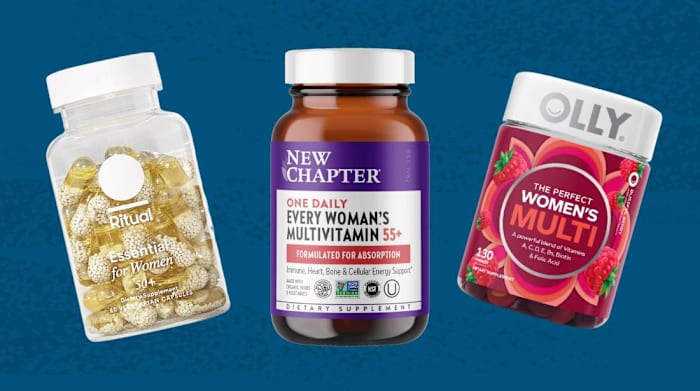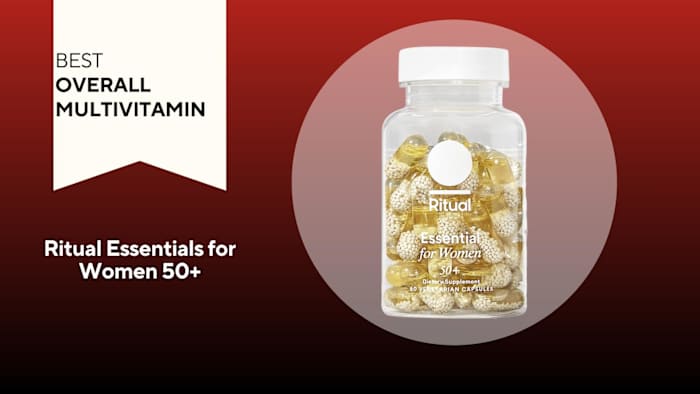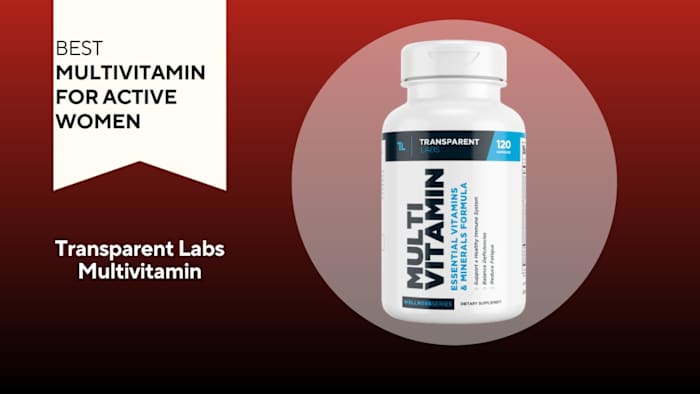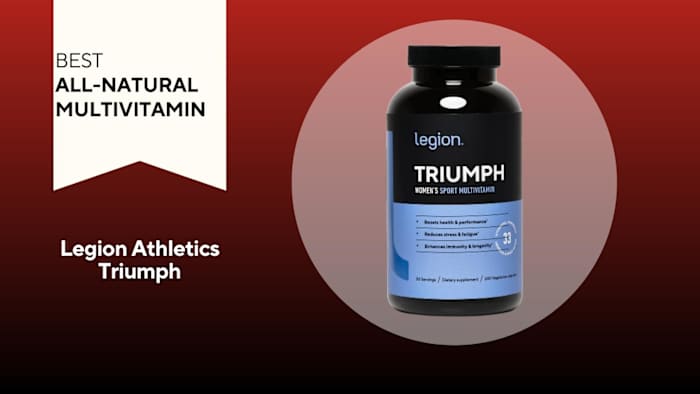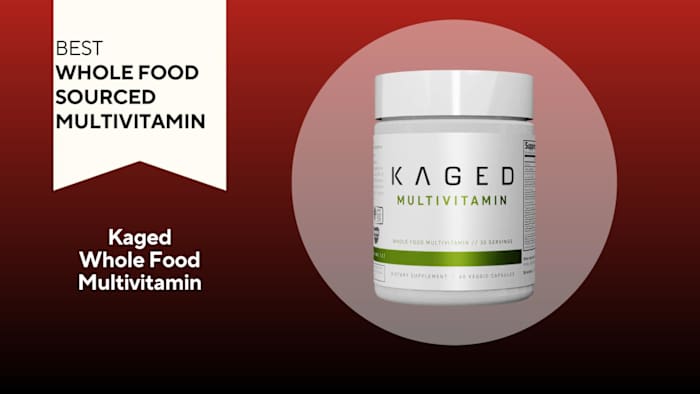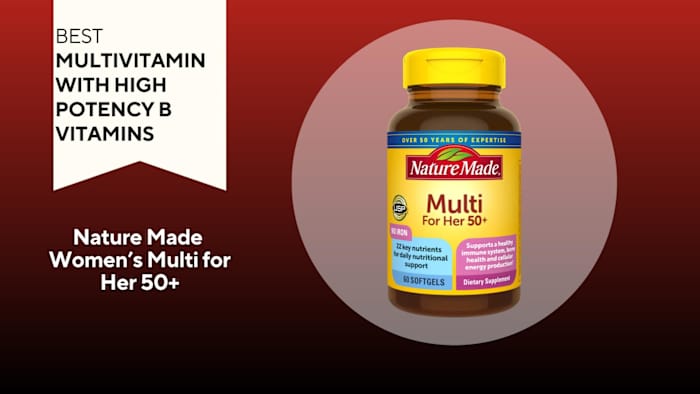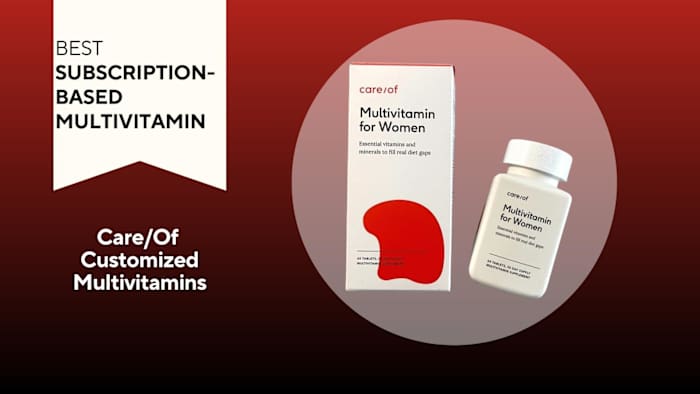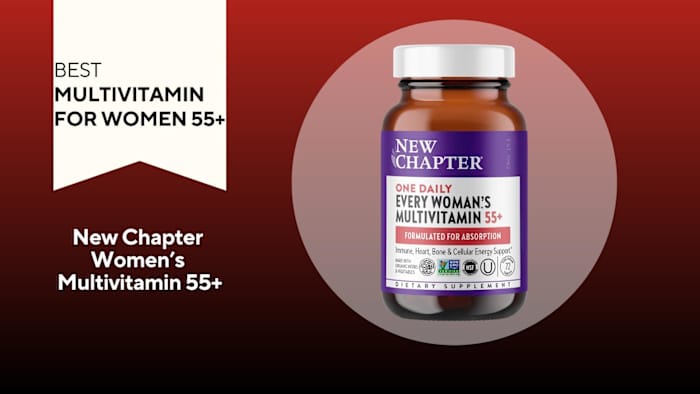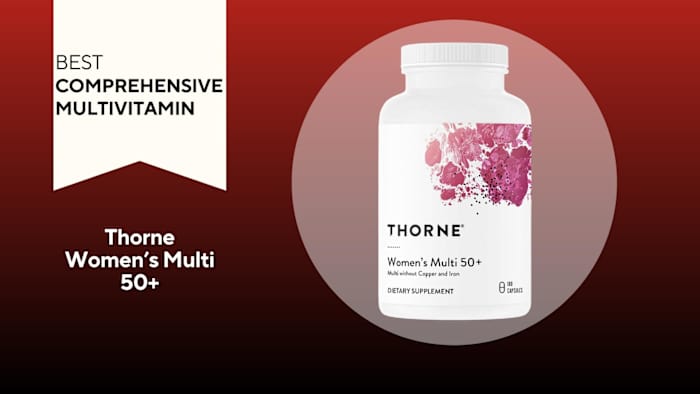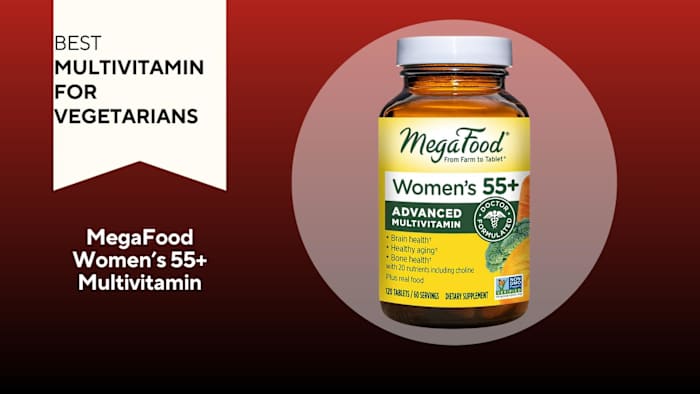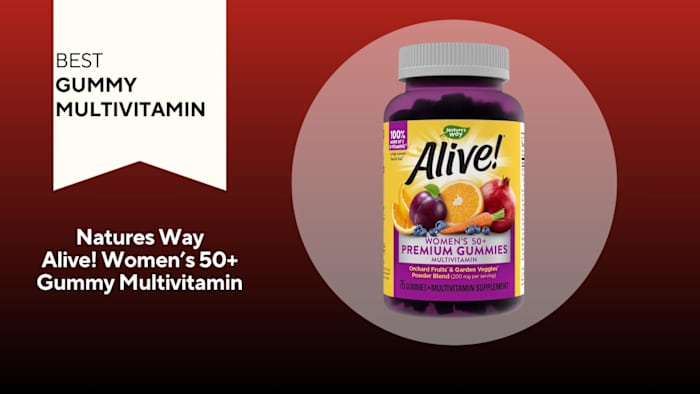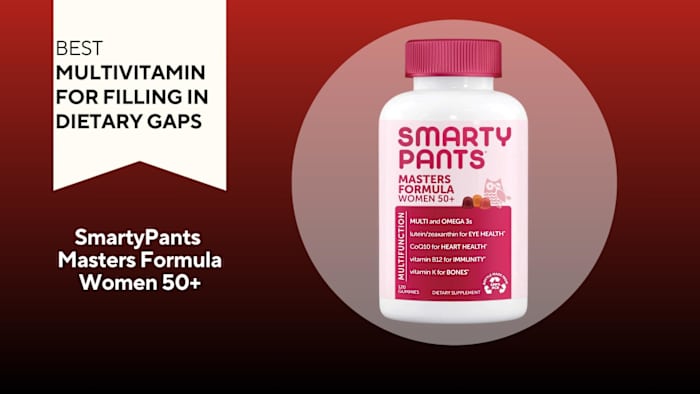The products featured in this article have been independently reviewed. When you buy something through the retail links on this page, we may earn commission at no cost to you, the reader. Sports Illustrated editorial staff are not involved in the creation of this content. Learn more here.
As you age, so do your nutritional and supplement requirements. Childbirth, the natural aging cycle and even menopause can have an impact on women's nutritional needs.
For instance, younger women who are menstruating need extra iron to replete the body’s iron stores and prevent anemia. After a woman’s period, usually around the age of 50, her iron needs drop drastically (1).
While postmenopausal women need less iron, they require higher amounts of nutrients like B6 and calcium (2) to support skeletal health and counteract physiological changes that result in decreased nutrient absorption. Plus, older women are more likely to be low or deficient in several nutrients, including vitamins D (3) and B12 (4).
In addition to a nutritious diet and a healthy lifestyle, taking a multivitamin specifically designed to support the needs of aging women can promote healthy aging and reduce the risk of nutrient deficiencies.
"Women over 50 should consider multivitamin supplements to address the increased risk of nutrient deficiencies that can come with age," explains Raj Dasgupta, MD. "These supplements can help support bone health, manage hormonal changes, boost immune function and provide antioxidants that contribute to overall well-being."
Fortunately, there are a number of high-quality multivitamin supplements that can help women over 50 feel their best physically and mentally. Find out which multivitamins we recommend, including a guide to choosing the right one.
This content is meant to be informative, but should not be taken as medical advice. It is not intended for use as diagnosis, prevention or treatment of health problems. Always speak with your doctor before starting any new supplement or exercise regimen.
Our Picks for the Best Multivitamin for Women Over 50:
- Best Overall Multivitamin: Ritual Essential for Women 50+
- Best Multivitamin for Active Women: Transparent Labs Multivitamin
- Best All-Natural Multivitamin: Legion Athletics Triumph
- Best Whole-Food Sourced Multivitamin: Kaged Whole Food Multivitamin
- Best Multivitamin with High Potency B Vitamins: Nature Made Women's Multi 50+ Softgels
- Best Subscription-Based Multivitamin: Care/Of Customized Multivitamins
- Best Multivitamin for Women 55+: New Chapter Women's Multivitamin 55+
- Best Comprehensive Multivitamin: Thorne Women's Multi 50+
- Best Multivitamin for Vegetarians: MegaFood Womens 55+ One Daily Multivitamin
- Best Gummy Multivitamin: Nature's Way Alive! Women's 50+ Gummy
- Best Multivitamin for Filling In Dietary Gaps: SmartyPants Masters Formula for Women 50+
Best Overall Multivitamin: Ritual Essential for Women Multivitamin 50+
Get 25% off your first month of Ritual! Code: SI25
Key features and specs:
- Type: Capsules
- Dosage: 2 capsules
- Number of servings per container: 30
- Key nutrients: B vitamins, magnesium, boron, Omega-3 DHA and Vitamins D3, E and K
- Certifications: Non-GMO
- Price per serving: $1.33
- Allergens: Gluten and major allergen-free
Why I picked it:
Designed for postmenopausal women, Essential for Women Multivitamin 50+ is iron-free and provides eight nutrients that help support healthy aging, including vitamin D, vitamin E, folate and the essential omega-3 fatty acid docosahexaenoic acid (DHA).
DHA is critical for healthy aging as it plays roles in brain health and immune function (5), and helps protect against physical and mental declines. But as we age, our bodies do not absorb DHA properly. For this reason, supplementing with DHA may help maintain optimal DHA levels in the body. It's usually derived from animal sources such as fish or krill, but Ritual uses vegan-friendly microalgae DHA.
The capsules are made with a mint essence, and the recommended dose is only two capsules, which may make this supplement more tolerable for women who have difficulty taking pills.
When you choose Ritual you’re choosing quality—it uses a third party lab to test their products for contaminants like allergens, heavy metals and microbes, and is also free of major allergens, gluten, GMOs, synthetic fillers and artificial colors.
For a more in-depth look at this multivitamin line, see our Ritual Vitamins review.
What we love:
- Subscription service may be convenient for some women
- Contains vegan-friendly DHA
- Each serving is only two mint-coated capsules
- Third-party tested for contaminants
What to consider:
- Lacking essential nutrients like B6 and iodine
- Subscription only product
Best Multivitamin for Active Women: Transparent Labs Multivitamin
Key features and specs:
- Type: Capsules
- Dosage: 4 capsules
- Number of servings per container: 30
- Key nutrients: B vitamins, iodine, magnesium, zinc, selenium, copper, manganese, chromium, chloride, potassium, N-acetyl cysteine, CoQ10 and Vitamins A, C, D3 and K
- Certifications: Current Good Manufacturing Practices (cGMP)
- Price per serving: $0.99
- Allergens: May contain nuts and dairy
Why I picked it:
Transparent Labs Multivitamin provides vitamins, minerals and other helpful compounds that active women over 50 need for optimal health.
This iron-free formulation is high in nutrients that tend to be low in many women’s diets, like B6, B12, Vitamin D and magnesium (6). Unlike many other multivitamins, it contains a relatively high level of Vitamin D, a fat-soluble vitamin essential for musculoskeletal health, immune function and brain health that many older women tend to be low or deficient in (7).
It also provides N-acetyl cysteine (NAC), a precursor to glutathione, a master antioxidant naturally produced by the body that protects against cellular damage by neutralizing harmful compounds like free radicals and lowers homocysteine levels. As we age, glutathione production slows (7), which can lead to increased levels of oxidative stress and cellular damage. Increased glutathione levels may be achieved by supplementing with NAC (8).
Additionally, Transparent Labs Multivitamin contains CoQ10, a fat-soluble antioxidant that’s essential for nutrient metabolism and helps prevent cellular damage. Like glutathione, CoQ10 levels may decline with age (9). Taking supplemental CoQ10 may help improve cellular function and reduce the risk of age-related health conditions like heart disease. Additionally, many cholesterol-lowering drugs hinder coQ10 production in the body, making supplementation more important.
What's even better? Transparent Labs Multivitamin contains ashwagandha, which may reduce symptoms of menopause (10) and helps the body adapt to reduce stress, including that induced by exercise.
For more in-depth information, check out our Transparent Labs Multivitamin review.
What we love:
- High doses of magnesium, B12, B6 and Vitamin D
- Contains CoQ10, a fat-soluble antioxidant essential for energy production
- Provides stress-reducing nutrients such as ashwagandha
- Provides a Certificate of Analysis (COA) for quality
- Iron-free
What to consider:
- Taking four capsules at once may be difficult for some to tolerate
- Expensive compared to other brands
Best All-Natural Multivitamin: Legion Athletics Triumph
Key features and specs:
- Type: Capsules
- Dosage: 8 capsules
- Number of servings per container: 30
- Key nutrients: Vitamin K1 and K2, folate, vitamin B12, ALA, Grape seed extract, maca, tribulus terrestris, CoQ10, olive leaf extract, CoQ10, maca
- Certifications: Labdoor certified. Made in NSF-certified and FDA-inspected and cGMP-compliant facilities
- Price per serving: $1.66 without subscription, $1.49 with subscription
- Allergens: Major-allergen free
Why I picked it:
When you’re prioritizing health and wellness, it’s important to know exactly what you’re putting in your body. Legion Athletics Triumph is our pick for the best all-natural multivitamin for women over 50 because of the brand’s promise that this supplement contains 100 percent natural ingredients. We love that this supplement does not contain any artificial fillers, flavors or food dyes, and according to Legion Athletics, is tested for purity and potency in an accredited lab.
Each dose of Triumph for women includes 22 vitamins and minerals, including vitamin D, vitamin B12, calcium and vitamin B6, as well as the antioxidants beta-carotene, selenium, vitamin C and vitamin E, which the National Institute on Aging suggest are essential as we get older (11).
Customers on the Legion Athletics website rave about this supplement’s formula and how it leaves them feeling. One user wrote, “I appreciate that Triumph is all natural with none of the chemical junk. It has what I need to balance my microbes and feel healthy and energized.” However, there are some complaints about the eight capsules dosage, and the way the capsules taste.
What we love:
- Ingredients are used in clinically effective doses that are shown to be safe and backed by scientific studies
- Third-party tested
- Money-back guarantee
What to consider:
- Serving size is eight capsules
- More costly than most multivitamin brands
Best Whole-Food Sourced Multivitamin: Kaged Multivitamin
Key features and specs:
- Type: Capsules
- Dosage: 2 capsules daily
- Number of servings per container: 30
- Key nutrients: Vitamin A, vitamin C, vitamin D, vitamin B6, vitamin B12, niacin, riboflavin, vitamin K, iron, iodine, manganese
- Certifications: Informed-Sport certified
- Price per serving: $1.17
- Allergens: None listed
Why I picked it:
Kaged Whole Food Multivitamins offers 100 percent DV of 21 essential vitamins and minerals completely sourced from whole foods. These 21 nutrients include several vitamins that are important for women as they age such as vitamin B12, vitamin B6 and vitamin K.
According to the National Institute of Health, adults over the age of 50 likely need a supplement or fortified foods to get enough vitamin B12 due to a lack of hydrochloric acid in their stomachs (26). Vitamin B12 is important for many of your body’s processes like creating healthy red blood cells and proper central nervous system function (23). Kaged Whole Food multivitamin has 100 percent DV of B12 sourced from chlorella.
Similarly, vitamin B6 is part of keeping your metabolism and immune systems running efficiently (27). Adults on a standard diet are not particularly at risk for a vitamin B6 deficiency, but one small study of older adults in assisted living facilities found that half of the residents in the facility had vitamin B6 deficiency (28). Kaged Whole Food multivitamins have 100 percent DV vitamin B6 sourced from spinach leaf.
Finally, a review of the research shows that vitamin K may play a role in preventing age-related cognitive decline (29), plus slowing age-related diseases like osteoporosis and bone fractures (30). The Kaged multivitamin has 100 percent DV vitamin K sourced from kale leaves and stems.
What we love:
- Contains 100 percent DV of 21 vitamins and minerals
- Third-party tested by Informed Sport for purity
- Affordable compared to other whole food vitamins that can cost $1.50-$2.00 per seving
What to consider:
- Has only four percent DV of calcium, which is a key nutrient that may help prevent bone loss in middle-aged women (31)
Best Multivitamin with High Potency B Vitamins: Nature Made Women’s 50+ Multi Soft Gels
Key features and specs:
- Type: Softgels
- Dosage: 1 softgel daily
- Number of servings per container: 60
- Key nutrients: Thiamin, riboflavin, niacin, vitamin B6, folate, vitamin B12, biotin, pantothenic acid
- Certifications: USP verified
- Price per serving: $0.23
- Allergens: None listed
Why I picked it:
Nature Made Women’s 50+ is the best multivitamin with high potency B vitamins because it contains over 100 percent DV of all eight B vitamins: thiamin, riboflavin, niacin, B6, folate, B12, biotin and pantothenic acid. B vitamins are critical to maintaining your body’s energy production, brain function and nervous system function, and the older population is at risk for a decrease in absorption of B vitamins (32).
In addition to the B vitamin complex, Nature Made Women’s 50+ has 15 percent DV calcium—which is about three times as much as the average multivitamin that contains between one and four percent DV. Calcium has traditionally been associated with keeping bones strong, but it also plays a role in muscle contractions, blood clotting and regulating heart rhythms (33). Postmenopausal women are at a particularly high risk of calcium deficiency because menopause decreases the body’s estrogen, and estrogen helps increase calcium absorption and retention (33).
What we love:
- Contains over 100 percent DV of all eight B vitamins
- Includes 15 percent DV calcium which is an essential supplement for postmenopausal women (33)
- Very budget-friendly at $0.22 per serving compared to over $1.00 per serving for some supplements with similar nutrients
What to consider:
- Low amounts of some minerals
Best Subscription-Based Multivitamin: Care/Of Multi
Key features and specs:
- Type: Capsules
- Dosage: 2 capsules per day (subject to change depending on your formula)
- Number of servings per container: 30
- Key nutrients: Individualized formulas based on your specific needs
- Certifications: Certified C.L.E.A.N.,
- Price per serving: $0.50 for the base formula, could increase depending on your customized formula
- Allergens: None listed
Why I picked it:
Care/Of has a line of basic multivitamins, but they also offer a subscription option with a customized multivitamin formula. To access your customized formula, Care/Of asks you to answer a handful of general questions like how old you are, your gender identification, where you live and your history of taking dietary supplements like multivitamins, collagen and protein powders.
The quiz also asks what you are hoping to address with a multivitamin supplement. After you answer this question, your quiz will deviate into more specific questions. For example, when I selected brain health as my priority, the questions asked about my sleep, short-term memory, brain fog and other related questions.
In total, the quiz takes about 10 minutes. If you’re looking for a subscription multivitamin that offers a customized formula instead of a generic one, Care/Of is a great option to try.
What we love:
- Subscription service that offers a customized multivitamin formula
- Basic multivitamin formulas available for comparable prices to popular brands (about $0.50 per serving)
- Personalization quiz only takes about 10 minutes to finish
What to consider:
- You have to submit your email address before being able to see your customized formula and pricing
Best Multivitamin for Women 55+: New Chapter Women’s Multivitamin 55+
Key features and specs:
- Type: Tablet
- Dosage: 1 tablet daily
- Number of servings per container: 72
- Key nutrients: Vitamin D3, vitamin B6, vitamin B12, thiamin, riboflavin, niacin, pantothenic acid, turmeric extract, Digestive Support Blend
- Certifications: NSF-certified gluten-free, Non-GMO Project verified, Where Food Comes From certified organic
- Price per serving: $0.70
- Allergens: None listed
Why I picked it:
Two features of New Chapter Women’s Multivitamin 55+ make the product stand out from other multivitamin supplements. First, the formula includes astaxanthin, an antioxidant that may help reduce muscle atrophy from disuse and protect the skin from sun-related aging (34).
Second, all of the nutrients in the formula come from fermented sources. According to New Chapter, the process of fermentation with probiotics can improve your body’s ability to absorb nutrients in the supplement. We couldn’t find any research to confirm this for a multivitamin supplement specifically, but research does suggest that fermentation may improve the digestion of nutrients from plant sources (35). Despite this, there is growing evidence that fermentation may act as a pre-digestion agent that helps your digestive system break down and absorb nutrients more efficiently (36).
Related Post: The Best Menopause Supplements, According to Experts
What we love:
- Contains astaxanthin, which may reduce muscle atrophy and sun-aging of the skin (34)
- All nutrients are from fermented sources which may increase absorption and improve digestion (36)
- Certified gluten-free, non-GMO and organic
What to consider:
- Contains two proprietary herbal blends that lack research to prove their effectiveness
Best Comprehensive Multivitamin: Thorne Women's Multivitamin 50+
Key features and specs:
- Type: Capsule
- Dosage: 6 capsules daily
- Number of servings per container: 30
- Key nutrients: Vitamin A, vitamin C, vitamin D, vitamin E, vitamin B12, calcium, magnesium, zinc, boron
- Certifications: Certified gluten-free (third-party lab not identified)
- Price per serving: $1.60
- Allergens: Iodine
Why I picked it:
Thorne Research Women’s Multivitamin 50+ is our pick for the best comprehensive multivitamin for women over 50 because it is packed with well over 100 percent DV of 12 essential vitamins. However, Thorne also has 18 percent DV calcium—a critical nutrient for bone health (33)—and 43 percent DV magnesium—which may improve physical performance in older women who exercise (39). Thorne has about four times more of each of these minerals than comparable multivitamins.
Each dose of Thorne Women’s Multi 50+ also contains 588 percent DV vitamin B6, 18,750 percent DV B12 and 125 percent vitamin D, along with 944 percent DV vitamin C and 1,787 percent DV vitamin E, which experts say are critical to immune function and energy production as we get older (32)(37)(38).
The serving of six pills per day may be daunting for some people, but reviewers on Amazon say they love the combination of vitamins and minerals in this supplement. One customer, Jesse Rose wrote, “I really like what this product has to offer. All the vitamins I had been taking separately all in one supplement.”
What we love:
- Formulated with more calcium and magnesium than other multivitamins, which may improve bone health and physical performance during exercise (39)(33)
- Includes high amounts of vitamins B6, B12, D, A, C and E which are crucial for immune health (32)(37)(38)
- Save 10-15% when you subscribe to recurring deliveries
What to consider:
- Six capsules per serving and some reviewers complain about the size of each capsule
- Some reviewers say there is a bad smell when you open the container
Best Multivitamin for Vegetarians: MegaFood Women's 55+ One Daily Multivitamin
Key features and specs:
- Type: Tablet
- Dosage: 2 tablets
- Number of servings per container: 60
- Key nutrients: Thiamin, niacin, riboflavin, vitamin B6, vitamin B12, choline, iodine, magnesium, zinc, selenium, copper, manganese, chromium
- Certifications: Non-GMO Project verified
- Price per serving: $0.85
- Allergens: None listed
Why I picked it:
MegaFood Women’s 55+ Multivitamin is a once daily tablet that is vegetarian-friendly and has a formula focused on essential vitamins and minerals that vegetarians may be deficient in by eliminating meat—specifically vitamin B12, vitamin D and zinc (40). MegaFood Women’s 55+ has 125 percent DV vitamin D, 833 percent DV vitamin B12 and 136 percent DV zinc.
However, what makes MegaFood Women’s 55+ stand out the most is the 36 percent DV choline included in the formula. Choline is an essential nutrient to many of the body’s processes, but the primary one is the production of acetylcholine, which is a neurotransmitter that your brain uses for memory, muscle control and nervous system functions (41).
What we love:
- Vegetarian supplement sourced from whole plant foods
- Includes 36 percent DV of choline, an essential nutrient for healthy brain function (41)
- Reviewers say they experience less stomach discomfort compared to other multivitamins
Cons
- Low amount of vitamin A (40 percent DV) compared to other plant-based multivitamins, even though vitamin A is one of the recommended nutrients for adults over 50
- The proprietary foods blend has little-to-no benefit due to the low dose (264 milligrams)
Best Gummy Multivitamin: Nature's Way Alive! Women’s 50+ Gummy
Key features and specs:
- Type: Gummy
- Dosage: 3 gummies
- Number of servings per container: 25
- Key nutrients: Vitamin A, vitamin C, vitamin D, vitamin B6, vitamin B12, thiamin, niacin, folate, riboflavin, biotin, iodine
- Certifications: None listed
- Price per serving: $0.53
- Allergens: Iodine
Why I picked it:
According to the National Institutes of Health, some essential vitamins for women become especially important as a person reaches postmenopausal age, such as vitamin D, vitamin B12 and vitamin B6 (11). However, not everyone is capable of or willing to take a capsule or tablet multivitamin to supplement these nutrients due to disability, discomfort with the size of the products or personal preference.
If that is you, Nature’s Way Alive! Women’s 50+ Gummy vitamins are a good multivitamin capsule alternative. These gummy vitamins are sweetened with cane sugar, plus have the additional flavor boost of an organic fruits and veggies powder blend that includes blueberry, apple, orange, plum and other fruit flavors. A full 67 percent of the reviews on Amazon mention the taste positively.
What we love:
- Has at least 50 percent DV of all eight B vitamins
- 67 percent of Amazon reviewers mention enjoying the taste
- Reviewers say the gummy form is easy to chew and swallow for those who struggle with pills or capsules
What to consider:
- Only 25 servings per container (most multivitamins come with at least 30 servings to provide a full month’s worth)
- Fewer minerals than the average multivitamin supplement
Best Multivitamin for Filling In Dietary Gaps: SmartyPants Masters Formula Women 50+
Key features and specs:
- Type: Gummy
- Dosage: 4 gummies
- Number of servings per container: 30
- Key nutrients: Vitamin C, vitamin D3, vitamin B6, vitamin B12, zinc, omega-3s, Lutemax, Coenzyme Q10, vitamin K2
- Certifications: Clean Label Project award winner, NSF certified, IGEN non-GMO certified
- Price per serving: $0.84
- Allergens: None listed
Why I picked it:
SmartyPants Masters Formula for Women 50+ is a gummy vitamin that contains 16 essential vitamins and minerals that are common in multivitamin supplements. However, what makes SmartyPants Masters Formula the best multivitamin for filling in dietary gaps are the “nonessential” nutrients that multivitamins tend not to include: omega-3s, coenzyme Q10, vitamin K2 and lutein.
Omega-3s are fatty acids most commonly found in fish or fish oil extracts. Omega-3s have known anti-inflammatory properties that can help fight your general inflammation (42). Research on Coenzyme Q10 (CoQ10) is still underway, but early reports suggest CoQ10 may increase your body’s production of antioxidants, and may provide additional benefits when used with medications to treat heart disease (43).
There is also emerging research from Japan that suggests vitamin K2 may be an effective treatment for osteoporosis by reducing the amount of new bone fractures (44). Researchers don’t fully understand the correlation yet, but the results are promising. Finally, SmartyPants Masters Formula includes lutein, which may help improve, or potentially prevent, age-related eye disease (45).
Bottom line: SmartyPants Masters Formula has moderate doses of common vitamins and minerals compared to other multivitamin supplements, but that’s because it is designed to fill the gaps for those who are otherwise consuming the majority of their vitamins through their diet. Plus, SmartyPants Masters Formula is packed with other “nonessential” nutrients that can fill dietary gaps for women over 50.
What we love:
- Includes “nonessential” nutrients that have a wide range of benefits for aging women
- Clean Label Project award winner for purity of ingredients
- Gummy vitamin that is easy to chew and swallow according to reviewers
What to consider:
- Includes lower amounts of the essential vitamins and minerals compared to other multivitamin supplements
- Has six grams of added sugar per serving which may not work for some users
What to Look for in a Multivitamin as a Woman over 50
When shopping for the best multivitamin to support your health, it’s important to keep a few things in mind. In addition to supplement ingredients, you’ll want to pay attention to supplement quality, certifications, form and price.
Essential micronutrients
Women over 50 have different nutrient needs than younger women. A key example is iron. Most women over 50 have stopped menstruating and have lower iron needs: Women aged 19-50 need around 18 milligrams of iron per day in order to support healthy iron levels and replace iron lost through their monthly periods (1), while women 51 years and older who’ve stopped menstruating need just eight milligrams of iron per day. Because of this, taking iron supplements isn’t necessary for most women over 50.
Keep in mind that some women over 50 with health conditions like iron deficiency anemia and those who follow restrictive diets may need to supplement with iron or receive iron infusions in order to maintain healthy levels.
While needs for certain nutrients, like iron, drop after the age of 50, daily requirements for other vitamins and minerals increase. For example, women over 50 need more B6 and calcium and are more likely to be low or deficient in B12 (19), magnesium, zinc and Vitamin D.
Even though studies investigating nutrient deficiencies in older adults are limited, some findings suggest that deficiencies in Vitamin D and B12 are common (19). As we age, our ability to absorb B12 from food declines as stomach acid levels decrease. In fact, up to 30 percent of adults over the age of 51 have atrophic gastritis (20)—inflammation of the stomach lining—with low stomach acid excretion, which interferes with B12 absorption. Plus, many older adults take medications that reduce the body’s ability to absorb B12, which further increases the risk of B12 deficiency. Also, people who follow primarily plant-based diets, like vegan diets, are at a higher risk of developing a B12 deficiency. For this reason, it’s recommended that adults over the age of 51 supplement their diet with B12.
Personal nutrient deficiencies
Identifying your specific deficiencies allows you to target your supplementation more effectively. For example, vitamin D deficiency is also common among older adults, which can negatively impact mood, immune function, bone health and more. Even though the current RDA is set at 600 IU of Vitamin D per day for adults aged 51-70 and 800 IU for adults over 70 (21), many people require higher doses of Vitamin D to maintain optimal levels.
However, not everyone is deficient in vitamin D. The only way to tell if you’re low in Vitamins D or B12 is to have your healthcare provider take a blood test. Most experts agree that optimal Vitamin D levels lie between 40–60 nanograms per milliliter[22](ng/mL). Blood levels less than 20 ng/mL indicate a Vitamin D deficiency and levels below 30 ng/mL indicate an insufficiency.
Normal B12 values lie between 160-950 picograms per milliliter (pg/mL). People with levels below 200 pg/mL are considered deficient, while those with between 200-300 pg/mL are considered low or marginal. Studies show that up to 40 percent of people in Western populations have low or marginal B12 levels (23).
Because B12 plays an important role in neurological health, low B12 status in older adults was found to be correlated to symptoms of depression (24). What’s more, older adults may not take in optimal amounts of other nutrients like magnesium, zinc and B6, which can negatively impact health in a number of ways and increase their risk for deficiency.
Because older adults are more likely to be low or deficient in certain nutrients and have increased needs for others, it’s important for women over 50 to choose a multivitamin that provides an array of nutrients, including B12, B6, Vitamin D, magnesium and zinc.
Quality
If you’re interested in purchasing a multivitamin supplement, it’s important to do your research first. There are thousands of supplement companies that offer multivitamins for women, but not all of them adhere to strict standards that help protect customers and ensure safe products.
The USDA doesn’t require dietary supplements to go through the same extensive pre-marketing testing and approval as medications. This means that supplement companies don’t need to prove their products are safe before they hit the market. However, some supplement companies choose to adhere to higher safety and quality standards in order to protect their customers.
When shopping for a supplement, it’s best to choose products from companies that hire independent third-party laboratories to conduct testing on their supplements for quality and purity. Look for companies certified by third-party organizations like UL, USP and NSF International.
Additionally, it’s important to choose supplements that use absorbable forms of nutrients in their products. Some forms of vitamins and minerals are less bioavailable to the body than others. For instance, zinc oxide and magnesium oxide have significantly lower absorption rates compared to higher-quality forms like magnesium glycinate and zinc citrate.
Certifications and ingredients
For people with allergies or specific dietary needs, choosing a supplement that’s free of potentially problematic ingredients is essential.
Some dietary supplements contain common allergens, like gluten, soy, tree nuts and milk. Those with conditions like celiac disease or a food allergy should take care when choosing a dietary supplement and opt for products that carry certifications that verify they’re free of allergens and other potentially harmful contaminants.
Women following vegan diets should be aware that many supplements contain animal-derived ingredients. Fortunately, a number of companies offer vegan-friendly products that are entirely plant-based.
Lastly, some products contain ingredients that you may want to avoid, like added sugar and artificial coloring.
To ensure you’re choosing a product that suits your health needs and dietary preferences, read supplement labels carefully before purchasing a multivitamin supplement.
Methodology: How We Chose the Best Multivitamins for Women Over 50
We chose products for our list of the best multivitamins for women over 50 based on a number of factors reflected in our multivitamin scoring methodology. These include:
- Key nutrients: The best comprehensive multivitamins for women over 50 provide most or all of the key vitamins and minerals needed by women ages 50+.
- Nutrient doses: Since multivitamins are often used to correct or prevent nutrient deficiencies, the best multivitamin supplements for women over 50 meet the RDA for key vitamins and minerals for women ages 50+.
- Certifications: Testing certifications from third-party labs prove that a dietary supplement contains what the brand says it contains in the doses advertised (potency). It also tests for harmful toxins (i.e. mold, heavy metals, etc.), and some check for banned substances (purity).
- Price: The cost of a daily multivitamin can add up. Often (though not always) the price of a supplement reflects its quality, which is why we include this category, but give it less weight in the overall score.
Finally, we receive input from our panel of expert contributors, which includes registered dietitians and highly credentialed experts in sports nutrition and exercise science.
Learn more about our nutrition and supplement review process, as well as our scoring methodology for women's multivitamins.
Multivitamins for Women Over 50 FAQs
Do I need a multivitamin specifically for my age as a woman over 50?
Although some women over 50 can meet their nutrition needs through diet alone, many women benefit from supplementing with one or more nutrients. This is because older women are more likely to be low or deficient in certain nutrients, like Vitamins D, B12 and B6. If you’re unsure whether or not you’d benefit from a multivitamin, consider your current diet and ask your healthcare provider to test levels of certain nutrients like B12 and Vitamin D. Also, if you’re following a restrictive diet or your diet is low in nutrient-dense foods, it’s likely that you’ll benefit from a multivitamin.
Do doctors recommend a multivitamin for women over 50?
Every woman is different, but many healthcare providers recommend that women over 50 supplement with certain nutrients, like zinc, magnesium and Vitamins D, B12 and B6, which are low in many people's diets, especially older adults. A healthcare provider who specializes in nutrition can assess your diet and overall health to help you determine your nutrient needs and whether or not a multivitamin is the best choice for you.
Do women over 50 need supplemental calcium?
Even though women over 50 have higher calcium needs, higher-dose calcium supplements aren’t always the best choice, especially in postmenopausal women. Taking high doses of calcium has recently been linked to an increased risk of heart disease (25). This is because if you take in more calcium from dietary supplements than your body needs, the extra calcium is deposited in your arteries, which can increase your risk of cardiovascular complications. "It might also increase the risk of kidney stones," explains Dr. Raj. "It's important for women over 50 to choose a multivitamin tailored to their age group and consult with their doctor to avoid over-supplementation and potential interactions with medications."
Even though women with conditions like osteopenia and osteoporosis may benefit from a high-quality calcium supplement, most women can meet their calcium needs by increasing their intake of calcium-rich foods like yogurt, kefir, beans and greens. It's best to talk with your healthcare provider before starting a calcium supplement.
Are gummy multivitamins effective?
Gummy multivitamins can be effective in providing essential vitamins and minerals to individuals who have difficulty swallowing traditional pill or capsule forms of supplements. However, their effectiveness can vary depending on several factors, including nutrient content, ingredient quality and dietary restrictions.
Is it better to take a multivitamin or individual vitamins?
Whether it's better to take a multivitamin or individual vitamins depends on your individual circumstances, dietary habits and specific nutritional needs. For example, if you have a known deficiency in a particular vitamin or mineral, it's often more effective to take an individual supplement for that specific nutrient to address the deficiency directly. This allows you to target your supplementation to your specific needs.
Final Thoughts
Taking a high-quality multivitamin can help women over 50 meet their needs for essential nutrients and reduce the risk of developing nutrient deficiencies. In tandem with following a healthy diet, exercising and managing stress, supplementing with any of the multivitamins on this list can help support healthy aging and reduce your risk of age-related conditions like heart disease and cognitive decline.
Expert Contributors
Chris Mohr, RD, Ph.D.
Chris Mohr is a registered dietitian who holds a Ph.D. in exercise physiology. He has worked with athletes ranging from NFL players to WWE wrestlers, along with celebrities and executives worldwide. He has been a featured speaker at many conferences around the world.
Raj Dasgupta, MD, FACP, FCCP, FAASM
Dr. Raj is a quadruple board-certified physician by the American Board of Internal Medicine, specializing in internal medicine, pulmonology, critical care and sleep medicine. He is also an active clinical researcher with more than 20 years of experience teaching around the world.
Jenevieve Roper, Ph.D, CSCS.
Dr. Jen Roper is an Associate Professor of Health and Human Sciences at Loyola Marymount University. She received her PhD in Physical Education, Sports and Exercise Science in 2015 from the University of New Mexico, with a specialization in Exercise Science and Biomechanics. She currently teaches a wide variety of courses, including Nutrition, Kinesiology and Scientific Principles of Strength & Conditioning.
Eddie Jo, Ph.D.
Dr. Eddie Jo is a professor of exercise physiology and the director of the Cal Poly Pomona Human Performance Research Lab. His research serves to innovate and advance the application of exercise training methodologies, nutrient intake and technologies for the optimization of human health and performance, energy metabolism, body composition and endocrine function.
Tim Ziegenfuss, PhD, CSCS, FISSN
Tim Ziegenfuss, PhD, CSCS, FISSN, is a standout in the world of sports nutrition and exercise science, bolstered by graduate degrees from Purdue University and Kent State University. Beyond academia, he's an influential driver of change on a global scale, serving as a Past President and Fellow of The International Society of Sports Nutrition, steering the field toward higher standards. As CEO of The Center for Applied Health Sciences, his focus is overseeing innovative research with real-world impact and guiding product ideation and creation for major retailers all around the world.
References
- National Institutes of Health. (2022, April 5). Office of Dietary Supplements - Iron. Nih.gov. https://ods.od.nih.gov/factsheets/Iron-HealthProfessional
- Heaney, R. P., Recker, R. R., Stegman, M. R., & Moy, A. J. (2009). Calcium absorption in women: Relationships to Calcium intake, Estrogen status, and age. Journal of Bone and Mineral Research, 4(4), 469–475. https://doi.org/10.1002/jbmr.5650040404
- Capatina, C., Carsote, M., Caragheorgheopol, A., Poiana, C., & Berteanu, M. (2014). Vitamin d deficiency in postmenopausal women - biological correlates. Maedica, 9(4), 316–322. https://www.ncbi.nlm.nih.gov/pmc/articles/PMC4316873/
- Shipton, M. J., & Thachil, J. (2015). Vitamin B12 deficiency - A 21st century perspective . Clinical medicine (London, England), 15(2), 145–150. https://doi.org/10.7861/clinmedicine.15-2-145
- Cardoso, C., Afonso, C., & Bandarra, N. M. (2016). Dietary DHA and health: cognitive function ageing. Nutrition research reviews, 29(2), 281–294. https://doi.org/10.1017/S0954422416000184
- Barbagallo, M., Veronese, N., & Dominguez, L. J. (2021). Magnesium in Aging, Health and Diseases. Nutrients, 13(2), 463. https://doi.org/10.3390/nu13020463
- Carilho Torrao, R. B., Dias, I. H., Bennett, S. J., Dunston, C. R., & Griffiths, H. R. (2013). Healthy ageing and depletion of intracellular glutathione influences T cell membrane thioredoxin-1 levels and cytokine secretion. Chemistry Central journal, 7(1), 150. https://doi.org/10.1186/1752-153X-7-150
- Tenório, M. C. D. S., Graciliano, N. G., Moura, F. A., Oliveira, A. C. M., & Goulart, M. O. F. (2021). N-Acetylcysteine (NAC): Impacts on Human Health. Antioxidants (Basel, Switzerland), 10(6), 967. https://doi.org/10.3390/antiox10060967
- Barcelos, I. P., & Haas, R. H. (2019). CoQ10 and Aging. Biology, 8(2), 28. https://doi.org/10.3390/biology8020028
- Gopal, S., Ajgaonkar, A., Kanchi, P., Kaundinya, A., Thakare, V., Chauhan, S., & Langade, D. (2021). Effect of an ashwagandha (Withania Somnifera) root extract on climacteric symptoms in women during perimenopause: A randomized, double-blind, placebo-controlled study. The journal of obstetrics and gynaecology research, 47(12), 4414–4425. https://doi.org/10.1111/jog.15030
- Dietary Supplements for Older Adults. (n.d.). National Institute on Aging. https://www.nia.nih.gov/health/dietary-supplements-older-adults#50
- American Heart Association. (2021, November 1). Fish and Omega-3 Fatty Acids. Www.heart.org. https://www.heart.org/en/healthy-living/healthy-eating/eat-smart/fats/fish-and-omega-3-fatty-acids
- Cleveland Clinic. (2022, February 8). Vitamin D Deficiency: Causes, Symptoms & Treatment. Cleveland Clinic. https://my.clevelandclinic.org/health/diseases/15050-vitamin-d-vitamin-d-deficiency
- Vitamin K may offer protective health benefits in older age. (2020, September 1). Harvard Health. https://www.health.harvard.edu/staying-healthy/vitamin-k-may-offer-protective-health-benefits-in-older-age
- Matteini, A. M., Walston, J. D., Fallin, M. D., Bandeen-Roche, K., Kao, W. H., Semba, R. D., Allen, R. H., Guralnik, J., Fried, L. P., & Stabler, S. P. (2008). Markers of B-vitamin deficiency and frailty in older women. The journal of nutrition, health & aging, 12(5), 303–308. https://doi.org/10.1007/BF02982659
- Deepika, & Maurya, P. K. (2022). Health Benefits of Quercetin in Age-Related Diseases. Molecules (Basel, Switzerland), 27(8), 2498. https://doi.org/10.3390/molecules27082498
- Rump, A., Weiss, F. N., Schulz, L., Kromrey, M. L., Scheuch, E., Tzvetkov, M. V., White, T., Durkee, S., Judge, K. W., Jannin, V., Bellamine, A., Weitschies, W., & Grimm, M. (2021). The Effect of Capsule-in-Capsule Combinations on In Vivo Disintegration in Human Volunteers: A Combined Imaging and Salivary Tracer Study. Pharmaceutics, 13(12), 2002. https://doi.org/10.3390/pharmaceutics13122002
- Davinelli, S., Nielsen, M. E., & Scapagnini, G. (2018). Astaxanthin in Skin Health, Repair, and Disease: A Comprehensive Review. Nutrients, 10(4), 522. https://doi.org/10.3390/nu10040522
- Norman, K., Haß, U., & Pirlich, M. (2021). Malnutrition in Older Adults-Recent Advances and Remaining Challenges. Nutrients, 13(8), 2764. https://doi.org/10.3390/nu13082764
- Stover P. J. (2010). Vitamin B12 and older adults. Current opinion in clinical nutrition and metabolic care, 13(1), 24–27. https://doi.org/10.1097/MCO.0b013e328333d157
- National Institutes of Health. (2022). Vitamin D. Nih.gov. https://ods.od.nih.gov/factsheets/VitaminD-HealthProfessional/
- Chauhan K, Shahrokhi M, Huecker MR. Vitamin D. [Updated 2023 Apr 9]. In: StatPearls [Internet]. Treasure Island (FL): StatPearls Publishing; 2023 Jan-. Available from: https://www.ncbi.nlm.nih.gov/books/NBK441912/
- National Institutes of Health. (2022, March 9). Office of Dietary Supplements - Vitamin B12. Nih.gov. https://ods.od.nih.gov/factsheets/VitaminB12-HealthProfessional/
- Laird, E. J., O'Halloran, A. M., Molloy, A. M., Healy, M., Hernandez, B., O'Connor, D. M. A., Kenny, R. A., & Briggs, R. (2023). Low vitamin B12 but not folate is associated with incident depressive symptoms in community-dwelling older adults: a 4-year longitudinal study. The British journal of nutrition, 130(2), 268–275. https://doi.org/10.1017/S0007114521004748
- Myung, S. K., Kim, H. B., Lee, Y. J., Choi, Y. J., & Oh, S. W. (2021). Calcium Supplements and Risk of Cardiovascular Disease: A Meta-Analysis of Clinical Trials. Nutrients, 13(2), 368. https://doi.org/10.3390/nu13020368
- National Institutes of Health. Office of Dietary Supplements - Vitamin B12. Nih.gov. https://ods.od.nih.gov/pdf/factsheets/VitaminB12-Consumer.pdf
- National Institute of Health. “Office of Dietary Supplements - Vitamin B6.” Nih.gov, 2017, ods.od.nih.gov/factsheets/VitaminB6-Consumer/.
- Kjeldby, Ida K, et al. “Vitamin B6 Deficiency and Diseases in Elderly People – a Study in Nursing Homes.” BMC Geriatrics, vol. 13, no. 1, 8 Feb. 2013, https://doi.org/10.1186/1471-2318-13-13.
- Mong, Michael A. “Vitamin K and the Visual System—a Narrative Review.” Nutrients, vol. 15, no. 8, 18 Apr. 2023, pp. 1948–1948, https://doi.org/10.3390/nu15081948.
- Popa, Daniela-Saveta, et al. “The Role of Vitamin K in Humans: Implication in Aging and Age-Associated Diseases.” Antioxidants, vol. 10, no. 4, 6 Apr. 2021, p. 566, www.ncbi.nlm.nih.gov/pmc/articles/PMC8067486/pdf/antioxidants-10-00566.pdf, https://doi.org/10.3390/antiox10040566.
- Smith, E L, et al. “Calcium Supplementation and Bone Loss in Middle-Aged Women.” The American Journal of Clinical Nutrition, vol. 50, no. 4, 1 Oct. 1989, pp. 833–842, https://doi.org/10.1093/ajcn/50.4.833.
- Hanna, Mary, et al. “B Vitamins: Functions and Uses in Medicine.” The Permanente Journal, vol. 26, no. 2, June 2022, pp. 89–97, https://doi.org/10.7812/tpp/21.204.
- Harvard School of Public Health. “Calcium.” The Nutrition Source, Harvard, 19 Oct. 2020, www.hsph.harvard.edu/nutritionsource/calcium/.
- Sztretye, Mónika, et al. “Astaxanthin: A Potential Mitochondrial-Targeted Antioxidant Treatment in Diseases and with Aging.” Oxidative Medicine and Cellular Longevity, vol. 2019, 11 Nov. 2019, pp. 1–14, https://doi.org/10.1155/2019/3849692.
- Knez, Eliza, et al. “Effect of Fermentation on the Nutritional Quality of the Selected Vegetables and Legumes and Their Health Effects.” Life, vol. 13, no. 3, 27 Feb. 2023, p. 655, https://doi.org/10.3390/life13030655.
- Leeuwendaal, Natasha K., et al. “Fermented Foods, Health and the Gut Microbiome.” Nutrients, vol. 14, no. 7, 6 Apr. 2022, p. 1527, pubmed.ncbi.nlm.nih.gov/35406140/, https://doi.org/10.3390/nu14071527.
- Dong, Honglin, et al. “Influence of Vitamin D Supplementation on Immune Function of Healthy Aging People: A Pilot Randomized Controlled Trial.” Frontiers in Nutrition, vol. 9, 1 Nov. 2022, https://doi.org/10.3389/fnut.2022.1005786.
- De la Fuente, Mónica, et al. “Vitamin c and Vitamin c plus E Improve the Immune Function in the Elderly.” Experimental Gerontology, vol. 142, 1 Dec. 2020, p. 111118, www.sciencedirect.com/science/article/abs/pii/S0531556520304666, https://doi.org/10.1016/j.exger.2020.111118.
- Veronese, Nicola, et al. “Effect of Oral Magnesium Supplementation on Physical Performance in Healthy Elderly Women Involved in a Weekly Exercise Program: A Randomized Controlled Trial.” The American Journal of Clinical Nutrition, vol. 100, no. 3, 2014, pp. 974–81, www.ncbi.nlm.nih.gov/pubmed/25008857, https://doi.org/10.3945/ajcn.113.080168.
- Craig, Winston John. “Nutrition Concerns and Health Effects of Vegetarian Diets.” Nutrition in Clinical Practice, vol. 25, no. 6, Dec. 2010, pp. 613–620, pubmed.ncbi.nlm.nih.gov/21139125/, https://doi.org/10.1177/0884533610385707.
- National Institutes of Health. “Office of Dietary Supplements - Choline.” Nih.gov, 2017, ods.od.nih.gov/factsheets/Choline-HealthProfessional/.
- National Institute of Health. “Office of Dietary Supplements - Omega-3 Fatty Acids.” Nih.gov, 2017, ods.od.nih.gov/factsheets/Omega3FattyAcids-HealthProfessional/.
- Sood, Brittany, and Michael Keenaghan. “Coenzyme Q10.” Nih.gov, StatPearls Publishing, Oct. 2019, www.ncbi.nlm.nih.gov/books/NBK531491/.
- Ishida, Yoichiro. “[Vitamin K2].” Clinical Calcium, vol. 18, no. 10, 1 Oct. 2008, pp. 1476–1482, pubmed.ncbi.nlm.nih.gov/18830045/.
- Buscemi, Silvio, et al. “The Effect of Lutein on Eye and Extra-Eye Health.” Nutrients, vol. 10, no. 9, 18 Sept. 2018, p. 1321, https://doi.org/10.3390/nu10091321.
These statements have not been evaluated by the Food and Drug Administration. These products are not intended to diagnose, treat, cure, or prevent any diseases.
Prices are accurate and items in stock as of publish time.
